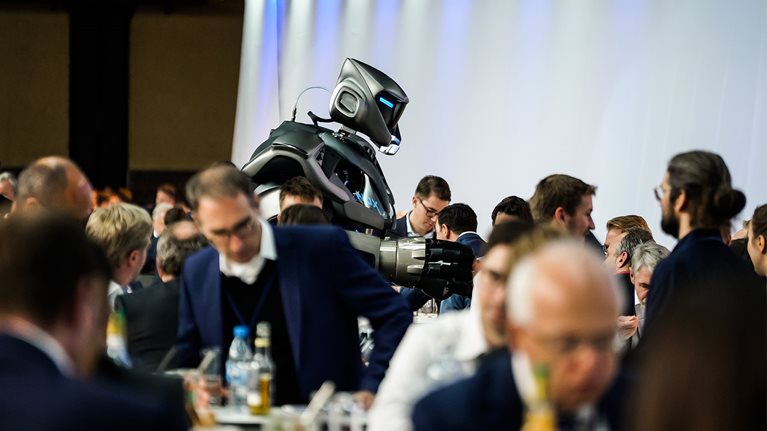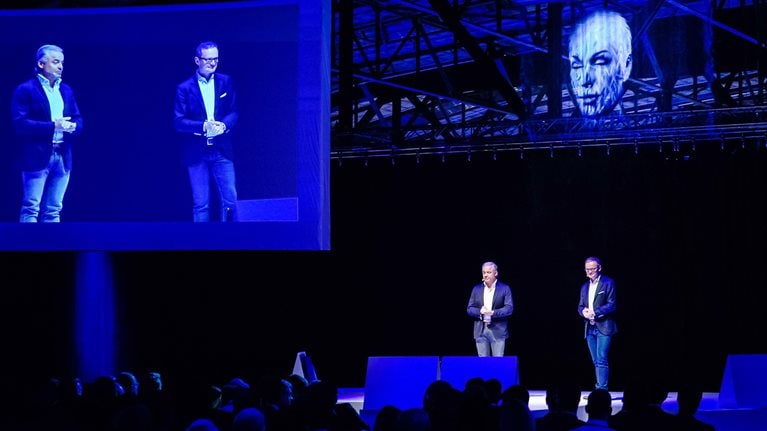When a nine-foot robot mingles in the crowd asking to take selfies, you know you’re not at a typical corporate event.
That clash of today and tomorrow was evident at “Leading in a Disruptive World,” an event recently held in Berlin. Hosted by McKinsey senior partners Gérard Richter and Peter Breuer, the event was an exploration of the leading edge of digital, analytics, and AI, bringing together about 1,000 executives, entrepreneurs, scientists, practitioners—and, of course, a few robots.
Seeing the future
One theme that clearly emerged among business leaders was the mixture of excitement about a future driven by digital and AI and a desire to better understand what it means and how to prepare for it. Some 85 percent of the top managers in automotive, engineering, aerospace, and defense industries, for example, believe that technological breakthroughs such as AI, the Internet of Things, and data-based business models will completely transform their businesses.
A McKinsey survey of senior executives, however, underlined how far companies need to go to prepare for that future, particularly in terms of capabilities, talent management, and cybersecurity.
“Everybody is thinking about and working on AI and their digital future,” said Jürgen Meffert, a senior partner at McKinsey. Added host Peter Breuer: “But it’s difficult to know what your options are and to see them in one place. That’s what this event did.”
Addressing this issue, the event made disruptive technologies like AI and advanced analytics practical. The “innovation fair” section of the event, for example, provided a practical glimpse into the future by featuring winners and finalists of The Spark, the German Digital Award (a joint venture by McKinsey and Handelsblatt, a leading German-language business newspaper).1 One of those winners was the robotics organization Magazino, a start-up that developed the Advanced Cooperative Robot Operation System (ACROS), which helps to program, control, and link robots, allowing them to share their experiences.

Germany’s digital potential
Another key theme was the digital potential of Germany. Tech giants in the United States and China have become significant drivers of the economy, but data show Germany lagging. Numerous conversations, presentations, and demonstrations showed, however, that Germany is actually a hotbed of innovation, building on a long tradition. (Quick question: Who invented the self-driving car? Answer: the German pioneer Ernst Dickmanns, who tested a self-driving vehicle on Germany’s autobahn in 1994.) With its manufacturing and industrial base, there is a clear sense that Germany has the best chances to be a leader in everything related to Industry 4.0.
To realize that digital future, Germany requires an investment ecosystem to help it scale promising business ideas. Keynote speaker Cornelius Baur, McKinsey senior partner in Germany, said the country would need about $20 billion per year in additional investment to be competitive with VC funding levels in the United States. That dearth of investment support is particularly evident in the automotive sector. Some 95 percent of funding for tech start-ups since 2010 has come from non-automotive sources.
Germany’s Federal Minister for Economic Affairs and Energy Peter Altmaier echoed that sentiment during his speech. He encouraged the business leaders in attendance to take advantage of the opportunities offered by digital technologies to help build Germany’s future.

Wrestling with data
With all the promise of digital, AI, and machine learning, one element that clearly took center stage was data. Without it, these innovations are impossible. While many acknowledged this reality, the sheer scale of the data and the speed at which it’s being created—90 percent of today’s data didn’t exist two years ago—is daunting. Business leaders spoke about the need to scale their investments in systems just to keep up.
Executives have come to terms with the idea that disruption is a fact of life and that their companies need to transform. Leading in a Disruptive World provided a vision of what that transformation might look like.
Barr Seitz is senior manager, editorial and digital communications, and is based in McKinsey’s New York office.
1The annual award recognizes promising German start-ups that have the potential to cause ground-breaking changes.